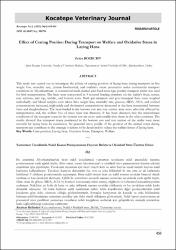Effect of crating position during transport on welfare and oxidative stress in laying hens
Citation
Bozkurt, Z. (2021). Effect of Crating Position During Transport on Welfare and Oxidative Stress in Laying Hens . Kocatepe Veterinary Journal , 14 (4) , 458-466 . DOI: 10.30607/kvj.985794Abstract
This study was carried out to investigate the effects of crating position of laying hens during transport on live weight loss, mortality rate, plasma biochemical, and oxidative stress parameters under commercial transport conditions in Afyonkarahisar. A commercial multi-decked and fixed-crate-type poultry transport trailer was used for bird transportation. The hens were transported in 9 selected loading positions on the trailer's front, center, rear sections, and top, middle, and bottom rows. Both pre-transport and post-transport hens were weighed individually, and blood samples were taken. Live weight loss, mortality rate, glucose, MDA, AOA, and cortisol concentrations increased, triglyceride and cholesterol concentrations decreased in the hens transported between farm and slaughterhouse. The hens loaded in the bottom row and rear section were most adversely affected by transportation and, the welfare loss of these hens was dramatic. It has been observed that the microclimate conditions of the transport crates in the bottom row are more unfavorable than those in the other positions. The results showed that transport crates positioned in the bottom row and rear section of the trailer were more stressful for laying hens. In conclusion, the potential stress profile of the position of the animal crates during transport can contribute to the strategic solutions to be developed to reduce the welfare losses of laying hens. Bu araştırma Afyonkarahisar'da ticari nakil koşullarında yumurtacı tavukların nakil aracındaki taşınma pozisyonunun canlı ağırlık kaybı, ölüm oranı, serum biyokimyasal ve oksidatif stres parametreleri üzerine etkisini araştırmak için yapılmıştır. Tavukların taşınması için ticari birçok katlı ve sabit hayvan kasalı kanatlı hayvan nakil kamyonu kullanılmıştır. Tavuklar, kamyon dorsesinin ön, orta ve arka bölümleri ile üst, orta ve alt katlarında belirlenen 9 yükleme pozisyonunda taşınmıştır. Hem nakil öncesi hem de nakil sonrası tavuklar bireysel olarak tartılmış ve kan örnekleri alınmıştır. Çiftlik ile kesimhane arasında taşınan yumurtacı tavuklarda canlı ağırlık kaybı, ölüm oranı ile glikoz, MDA, AOA ve kortizol konsantrasyonları artmış, trigliserit ve kolesterol konsantrasyonları azalmıştır. Nakilden en fazla alt katta ve arka bölümde taşınan tavuklar etkilenmiş ve bu tavukların refah kaybı dramatik olmuştur. Alt katta bulunan nakil kasalarının mikro iklim koşullarının diğer pozisyonlardaki nakil kasalarına göre daha olumsuz olduğu gözlemlenmiştir. Sonuçlar kamyonun alt katında ve arka bölümünde bulunan nakil kasalarının yumurtacı tavuklar için daha stresli olduğunu göstermiştir. Nakil kasası pozisyonuna ait potansiyel stres profilinin yumurtacı tavukların refah kayıplarını azaltmak için geliştirilecek stratejik çözümlere katkı sağlayabileceği sonucuna varılmıştır.



















